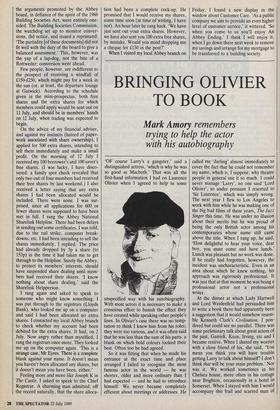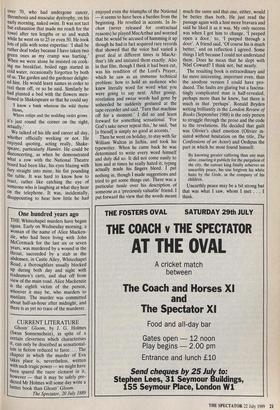BRINGING OLIVIER TO BOOK
Mark Amory remembers
trying to help the actor with his autobiography
'OF course Larry's a gangster,' said a distinguished actress, 'which is why he was so good as Macbeth.' That was all the first-hand information I had on Laurence Olivier when I agreed to help in some unspecified way with his autobiography. With most actors it is necessary to make a conscious effort to banish the effect they have created while speaking other people's lines. In Olivier's case there was no temp- tation to think I knew him from his roles; they were too various, and it was often said that he was less than the sum of his parts, a blank on which bold colours looked their best. Often too he had agreed.
So it was fitting that when he made his entrance at the exact time and place arranged I failed to recognise the most famous actor in the world — he was shorter, older and more ordinary than I had expected — and he had to introduce himself. We never became completely efficient about meetings or addresses. He called me 'darling' almost immediately to cover the fact that he could not remember my name, which is, I suppose, why theatre people in general use it so much. I could never manage 'Larry', no one said 'Lord Olivier', so under pressure I resorted to 'Sir Laurence', which was simply wrong. The next year I flew to Los Angeles to work with him while he was making one of the big bad films of these years, The Jazz Singer this time. He was under no illusion about their merits but he was proud of being the only British actor among his contemporaries whose name still came above the title. When I rang up, he said, 'How delightful to hear your voice, dear boy, you must come and have lunch.' Lunch was pleasant but no work was done. If he really had forgotten, however, the incident was uncharacteristic. Even in an area about which he knew nothing, his approach was rigorously professional. It was just that at that moment he was being a professional actor not a professional writer.
At the dinner at which Lady Hartwell and Lord Weidenfeld had persuaded him to write a book there had apparently been a suggestion that it would somehow resem- ble Kenneth Clark's Civilisation. I pon- dered but could see no parallel. There was some preliminary talk about great actors of the past, Garrick, Kean, Irving, etc and I became restive. When I shared my worries with a close friend of his, she said, 'You mean you think you will have trouble getting Larry to talk about himself? I don't think that will be your main problem.' Nor was it. We worked sometimes in his Chelsea house, more often in his cottage near Brighton, occasionally in a hotel in Somerset. When I stayed with him I would accompany this frail and scarred man of
over 70, who had undergone cancer, thrombosis and muscular dystrophy, on his early morning, naked swim. It was not tact but exhaustion that made me reach for the towel after ten lengths or so and watch while he went on to 25 or even 50. He took lots of pills with some expertise: 'I shall be rather deaf today because I have taken two green ones as my cramp was hurting.' When we were alone he insisted on cook- ing me breakfast, boiled eggs started in cold water, occasionally forgotten by both of us. The garden and the gardener delight- ed him. He would learn names in order to reel them off, or so he said. Similarly he had planted a bed with the flowers men- tioned in Shakespeare so that he could say
I know a bank whereon the wild thyme blows, Where oxlips and the nodding violet grows it's just round the corner on the right, actually.'
We talked of his life and career all day, whether officially working or not. He enjoyed quoting, acting really, Shake- speare, particularly Hamlet. He could be disconcerting, as when he demonstrated what a row with the National Theatre board had been like, his eyes blazing with fury straight into mine, his fist pounding the table. It was hard to know how to react, rather like catching the eye of someone who is laughing at what they hear on the telephone. It was, incidentally, disappointing to hear how little he had enjoyed even the triumphs of the National — it seems to have been a burden from the beginning. He revelled in accents. In In- chon (never released for contractual reasons) he played MacArthur and worried that he would be accused of hamming it up though he had in fact acquired rare records that showed that the voice had varied a great deal at different times in MacAr- thur's life and imitated them exactly. Also in that film, though I think it had been cut, was his rendition of the Lord's Prayer, which he saw as an immense technical problem: how to hold an audience who knew literally word for word what you were going to say next. After gossip, revelation and swear words had gone by unheeded he suddenly gestured at the tape-recorder and said, 'Turn that machine off for a moment.' I did so and leant forward for something sensational. 'For God's sake never repeat this,' he said, 'but [a friend] is simply no good at accents.'
Then he went on holiday, to stay with Sir William Walton in Ischia, and took his typewriter. When he came back he was determined to write every word himself and duly did so. It did not come easily to him and at times he really hated it; typing actually made his fingers bleed. I put nothing in, though I made suggestions and tried to get some things out. There was a particular tussle over his description of someone as a 'preciously valuable' friend. I put forward the view that the words meant much the same and that one, either, would be better than both. He just read the passage again with a hint more bravura and said he liked it as it was. My only success was when I got him to change, 'I peeped open a door,' to, 'I peeped through a door'. A friend said, 'Of course his is much better,' and on reflection I agreed. Some things I left because I could not understand them. Does he mean that he slept with Noel Coward? I think not, but nearly.
The resulting book is extraordinary and far more interesting, important even, than the anodyne version I could have pro- duced. The faults are glaring but a fascina- tingly complicated man is half-revealed, perhaps more than he knew, but there is much in that 'perhaps'. Ronald Bryden writing brilliantly in the London Review of Books (September 1988) is the only person to struggle through the prose and the code to the revelations. He decided that guilt was Olivier's chief emotion (Olivier in- sisted without hesitation on the title, The Confessions of an Actor) and Oedipus the part in which he most found himself:
By knowing greater suffering than any man alive, enacting it publicly for the purgation of the city, the outcast king finally achieves an unearthly peace, his sins forgiven his white hairs by the Gods, in the company of his children.
Unearthly peace may be a bit strong but that was what I saw, whom I met . . . I think.



















































 Previous page
Previous page